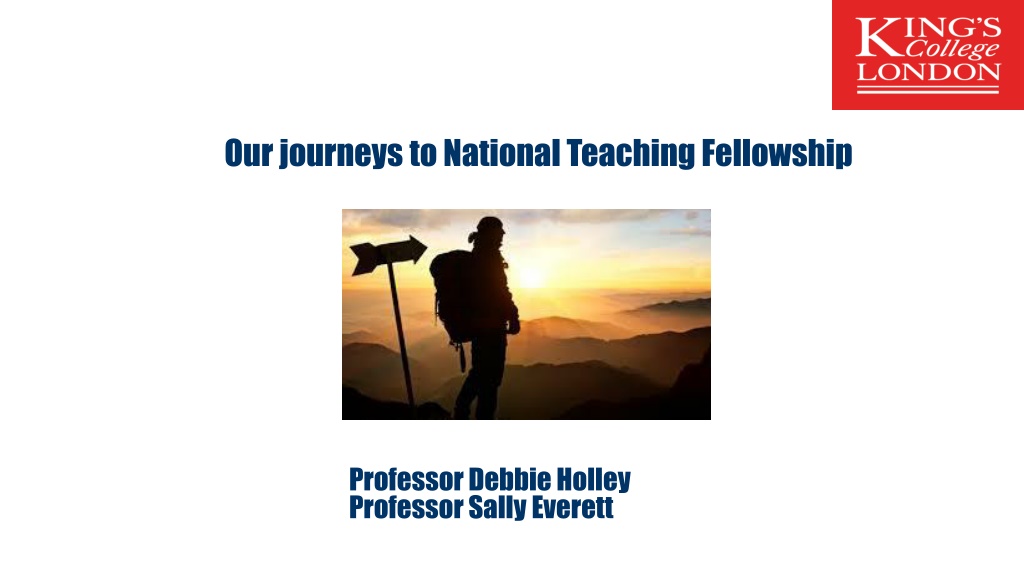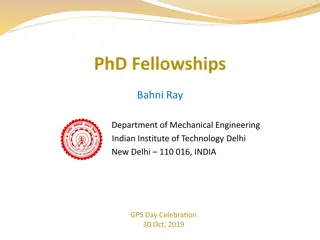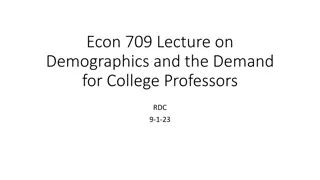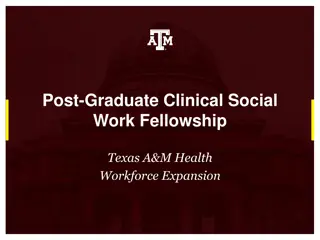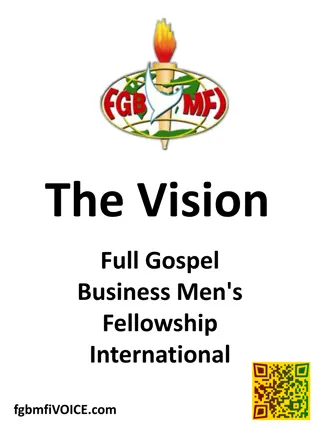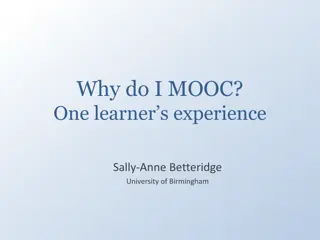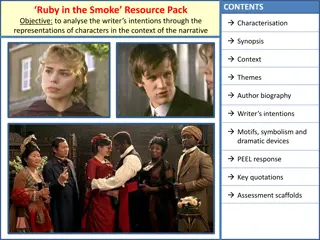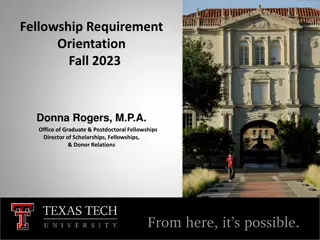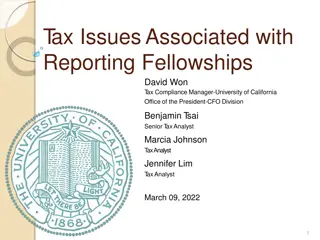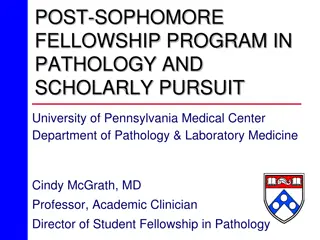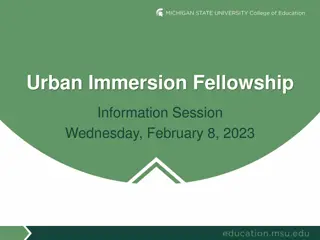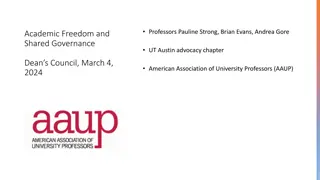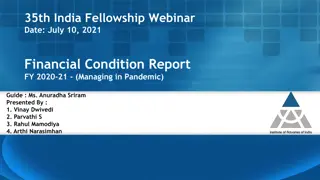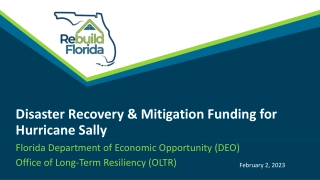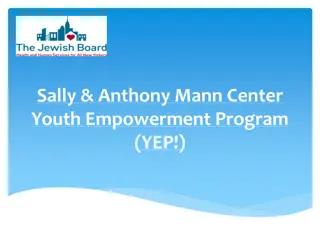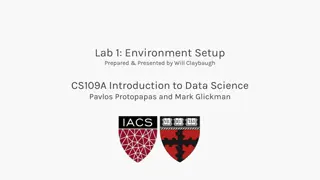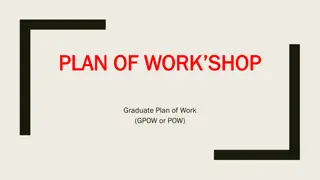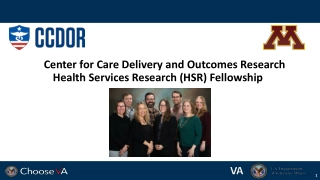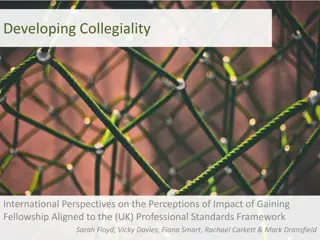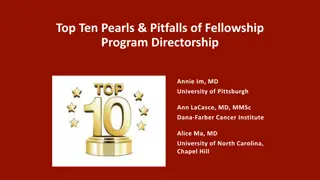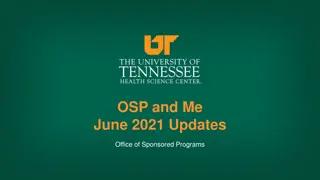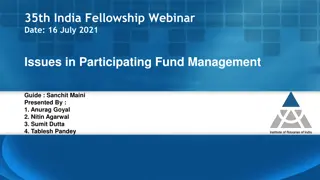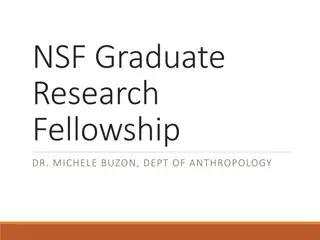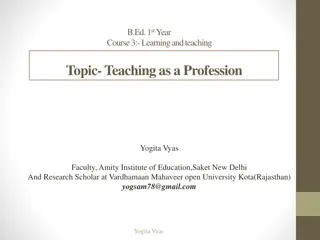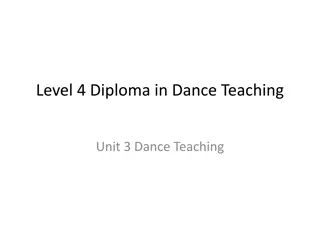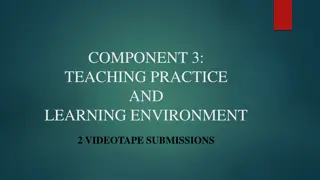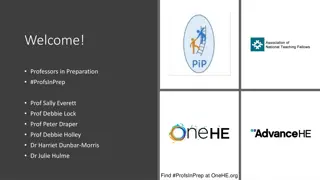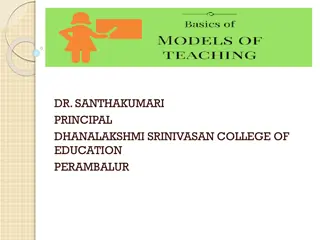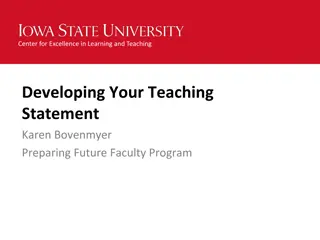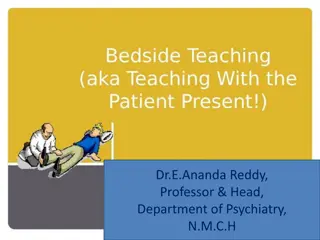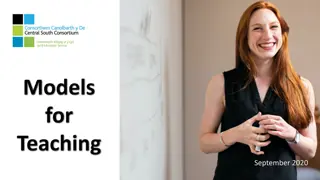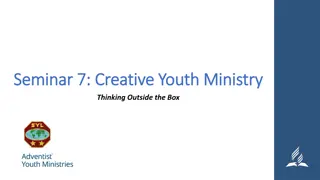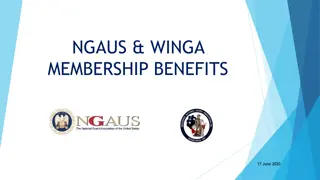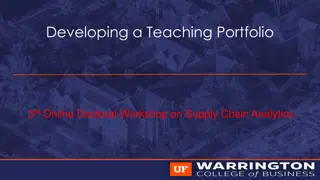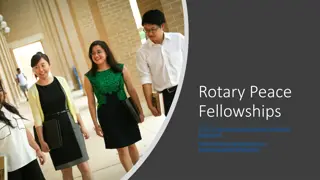Journey to National Teaching Fellowship with Professors Debbie Holley & Sally Everett
"Exploring the exceptional journeys of Professors Debbie Holley and Sally Everett towards achieving the National Teaching Fellowship. Discover their myths debunked, development of excellence, and impact in education. Uncover the influence of collaboration, innovation, and perseverance in higher education. Explore their paths to success through dedication and community support."
Download Presentation

Please find below an Image/Link to download the presentation.
The content on the website is provided AS IS for your information and personal use only. It may not be sold, licensed, or shared on other websites without obtaining consent from the author. Download presentation by click this link. If you encounter any issues during the download, it is possible that the publisher has removed the file from their server.
E N D
Presentation Transcript
Our journeys to National Teaching Fellowship Professor Debbie Holley Professor Sally Everett
National Teaching Fellowship An ongoing journey travelled with fabulous colleagues, peers and students Mythbusting: You have to be at a Russell Group (no) You have to be a Professor (no but it helped me get there) No-one gets it first time (some do it took me 4 goes!) You have to be a single discipline expert (see my checkered career I did 10 years in industry before I came into HE) My National Teaching Fellowship opened doors some of which took a deep breath to step through.. Gives me a HUGE supportive community post your question one afternoon, and by the next morning you have an evidence base shared by experts Debbie Holley, Professor of Learning Innovation, PFHEA and NTF Bournemouth University. Proud to be elected to the ANTF Committee in 2019 @NTF_Tweet @debbieholley1 And confidence to articulate my value (and my values) in what can be a tick box culture in HE
Developing excellence I articulated my work conceptualising different learning spaces for students both physical and virtual. Labyrinths (this is one I made earlier!) Drawing upon a research body of work on first year students at 3 Universities (none of it funded all on goodwill between colleagues at LondonMet, Westminster and Queen Mary) Raising the profile of excellence I drew upon my work with the Reusable Learning Object CETL, which had student co- design at the centre Most of this was un-funded, just workload time allocated, but got me onto a national project. I highlighted my own IMPACT within the project as well as the impact of the project Individual excellence Have a philosophy, set of values or framework Mine was underpinned by access to, and induction through, HE I framed my space as the digital divide and strategies overcoming this and articulated the IMPACT National Teaching Fellow Briefing KCL 06.01.2020
In terms of the esteem in which Debbie is held by her peers, she has gained an impressive number of awards during her membership. I had a difficult third year .. appreciate your patience .. really sorry . I wasn't as professional as I should have been. So it was a huge relief when I realised that your support had dragged me kicking and screaming over the finish line!! Unit evaluation Student A Professional Development Director Chartered Institute of Logistics and Transport (CILT) The power of the quote Illustrate your application show your contribution through the lens of peers, students, collaborators be upfront and ask for feedback! Just watched your pep talk and thought it was great. Precise, concise and innovative. I liked the visual and audio together, much better than a written text which can be interpreted in many ways... and much more personable .This technology should be used in ALL modules, so all students know what is expected, to decrease the stress levels... I found Dr Holley s session inspirational I had no idea research could be so revealing ... workshop participant feedback (OFSTED Impact study, April 2012)
Professor Sally Everett Proud NTF and CATE Professor of Business Education (NTF also helped me get this!) Inclusive Education Lead (KCL) Previously a Deputy Dean (Quality and Student Experience) and Head of Department (Tourism & Marketing) Equality and Diversity Officer, NTF committee and Chartered Association of Business Schools PFHEA Dog lover and fun runner 5
One page summary of the application Criterion 1: Individual excellence Criterion 2: Raising the profile of excellence Criterion 3: Developing excellence Active learning in my own teaching Develop curricula e.g. new online work-based degree for travel industry Assessment and Feedback projects Employability panels, strategy, assessment days, career module, intern scheme (CATE) Textbook/papers Lots of lovely quotes and data! Leadership impact (rankings) Innovation research centre Organised learning conferences Chair Disability/ Inclusive Education Working Group reversed gap Funding for inclusive media labs (Human Library) Organise and lead staff networks/events Lots of lovely quotes and data! Lead by example - PFHEA Team Based Learning and adoption Vision visits (USA and UK) Approval events CPD Conference presentations and dissemination Lots of lovely quotes and data!
Write it all down. Keep the evidence safe! Plaudits file! I enjoyed Sally s lectures as it s so interesting and linked to articles and our own stories (2010), best unit by far (2010), Sally s the best passion and great use of information (2011), she seems to put a lot of effort into planning lessons (2012). Sally, we are all very clear that the exceptional progress on the NSS is due in large part to you. Every bit of your hard work and determination to sort this, through thick and thin, is both recognised and much appreciated. (Prof Thorne, Vice Chancellor, 2014). , Just a quick note to say a huge thank you for today. It was thought provoking, inspiring, and was well organised. The student input was powerful . The SU s Education Officer, "Sally's impact on the inclusivity of teaching at ARU has really been felt by students regardless of disability and has significantly improved the learning experience. Sally really has pioneered our inclusive practices through the DWG and has always involved students and the Students' Union in this work which has been fantastic." So proud, congrats on the amazing transformation you brought to our school!
Thinking about applying for a National Teaching Fellowship (NTF) Award?
The plan Introductions Introduce the NTF 2020 scheme Illustrate personal and institutional benefits Discuss the NTF 2020 application process Give practical guidance from current NTFs
Background to NTFS NTFS recognises, rewards and celebrates individuals who make an outstanding impact on student outcomes and the teaching profession The scheme is organised by Advance HE The UK Teaching Excellence Awards Advisory Panel (senior representatives form four UK nations) advises on the criteria, QA of assessment process and the selection of the winners Guidance for individuals and institutions is available on the Advance HE website important to read this Short informal videos
Key things to note for 2020 Closing date Wednesday 18 March 2020 by 12:00 (GMT) Nominations must be submitted by NTFS Institutional Contact Embargoed announcement to winners w/c 13 July 2020 w/c 3 August public announcement email NTFS@advance-he.ac.uk for any queries ANTF advice: don t leave submission to the last minute. Speak to your IC now for all the process requirements and get all their help eg VC s support, mentor for you
What are the benefits to individuals? It is widely recognised in HE in the UK and internationally as an accolade that is difficult to achieve and is a mark of quality It opens doors: many NTFs find they can use the award as a springboard to progress their careers You join a national community of like-minded professionals who are passionate about teaching The ANTF network is a fantastically supportive community of learning Being a National Teacher Fellow has changed my life, my career, everything
What are the benefits for institutions? The scheme is increasingly used as a model to develop and extend university-wide schemes, aiming to raise the status of teaching and instil pride in the profession and student learning, and enhance universities reputations It can be a focal point for discussions about professional development It can enable staff to cross boundaries, collaborating with colleagues in other disciplines and forging links with universities nationally and internationally
Review process Independent, external peer reviewers all experienced in criteria-based assessment Reviewers receive nominee Claim and supporting statement only and score part B of the Claim against the three awards criteria All nominations are reviewed by three reviewers Fourth reviewer used for any discrepant scores and closest three scores used in ranking
Nomination documents Claim for National Teaching Fellowship: a statement written by the individual of how they demonstrate impact relevant to each of the three award criteria: maximum 1500 words per criterion (4500 in total) plus Context Statement (max 300 words) and Reference List Signed Statement of Support from the institution s Vice- Chancellor or equivalent (maximum 1000 words). Nomination Form (see Advance HE website) Supported and submitted by your Institutional Contact
Context statement Provides a frame for the Claim and enables reviewers to orientate themselves into the evidence provided against each of the award criteria Not scored Explain the context of your institution and your professional role(s) and responsibilities within it Write in the first person (use I ) Maximum 300 words Examples in the Advance HE guidance
Three NTFS award criteria Criterion 1: Individual excellence: Evidence of enhancing and transforming student outcomes and/or the teaching profession: demonstrating impact commensurate with the individual s context and the opportunities afforded by it. Criterion 2: Raising the profile of excellence: Evidence of supporting colleagues and influencing support for student learning and/or the teaching profession; demonstrating impact and engagement beyond the nominee s immediate academic or professional role. Criterion 3: Developing excellence: Evidence of the nominee s commitment to and impact of ongoing professional development with regard to teaching and learning and/or learning support.
Reach, Value and Impact Within each of the Criteria, reviewers will be looking for evidence of Reach, Value and Impact Each of the three award criteria above is given equal consideration in the assessment process and weighted equally in the overall score Evidence is key , can be both qualitative and quantitative for all criteria and RVI Examples to follow are not cumulative but do include all you can
How will you evidence your Reach? Reach - The scale of your influence: Examples National and International impact Width across your institution eg department/ faculty Across different groups of students, individuals and/or organisations e.g. academic levels, commuter students, BAME students, online learners etc
How will you evidence your Value? Value Examples A change in approach to learning among students or staff e.g. expanding the student experience or teaching practice. Positive impact on wider issues in education e.g. ethical issues
How will you evidence your Impact? Impact - the difference that has been made to policy, practice and/or student outcomes Example Change in teaching practice Change in professional support practice New policy or organisational unit adopted
Where is your impact felt? Department? Faculty? Institution? Regional? National? International? Discipline/cross-discipline? Professional bodies/wider sector? And in these contexts, how does it explicitly relate to teaching and student learning? How are you measuring/evaluating impact? 26
What types of evidence do you have that show impact? Longitudinal? Quantitative? Qualitative? Short, concise quotes from students, colleagues, others? Scholarly, pedagogic evidence? Improved student attainment results? Improved student outcomes (e.g. retention, employability, etc.)? Evidence of the impact of your practice/research/publications on the teaching and learning practices of others leading to enhanced student learning? 27
What kind of Evidence? Open your heart Who are you as an excellent practitioner? What is special about you and what you do? And how do you know that it works well? What is your story?
What kinds of evidence are convincing? (ANTF advice) Anything that gives external validation to your claim, so that it is supported rather than being mere assertion This is likely to involve raiding your plaudits file for verbatim quotes demonstrating your excellence These can be from module evaluations, feedback forums, student comments, letters and emails Aim to collect a range of quotes from current and past students at different levels, past and current colleagues, managers, employers who take your students on placement, external examiners etc. You don t need to provide full detail of each originator of quotes: former 2nd-year student previous line-manager , employer of our graduates etc is sufficient detail
Collecting and using evidence (ANTF advice) Qualitative data can be really useful: it s helpful to include statements such as Over the past five years my student evaluations have averaged 80+ who said I was good or excellent, and this is higher than average within my department You are not expected (or allowed) to provide supporting documentation but your own HEI is expected to assure the validity of your application You should aim to match your evidence with the three criteria, so you can add quotes and data to each section
You need to demonstrate scholarship and commitment to reflection (ANTF advice) Your application should include reference to a handful of texts (books, journal articles etc) from which your educational philosophy and teaching approaches have derived The application, however, is all about you, so you need to use the first person singular and refer to your achievements rather than your teams , It s helpful to include examples of where you ve changed your practices in the light of experience or where your scholarship has guided you to change
Features of successful past Claims (NB these are not a tick list!) Clearly defined context Structured narrative Use of different sources of evidence, considering reach, value and impact Use of publications Selective use of scholarly references, relevant to the nominee s context and claim Plain English Clearly expressed, reflective narrative Balance of both qualitative and quantitative evidence Use of cross-references within the claim. 32
ANTF advice for people thinking of applying in future years If you are thinking of applying after 2020, it s worth thinking about building your profile further over the next year or so Start collecting positive feedback to meet the Criteria from a range of stakeholders including students, peers, colleagues, line managers, external examiners etc Keep yourself up-to-date by regularly scrutinising the Advance HE website for information
Thank you! Any queries, please contact your institutional link or Advance HE
